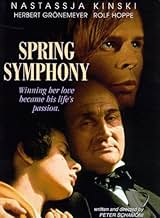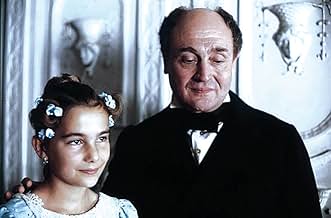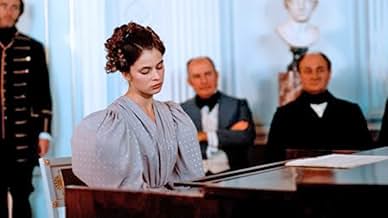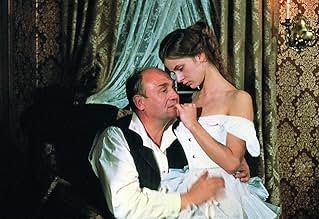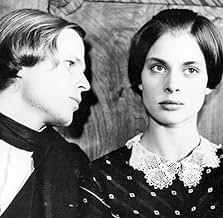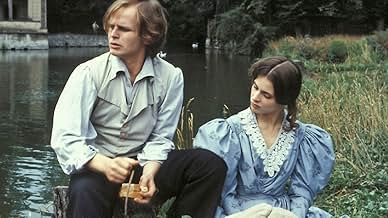PUNTUACIÓN EN IMDb
6,1/10
385
TU PUNTUACIÓN
Añade un argumento en tu idiomaChronicles the illustrious 19th-century love affair between composer Robert Schumann and pianist Clara Wieck.Chronicles the illustrious 19th-century love affair between composer Robert Schumann and pianist Clara Wieck.Chronicles the illustrious 19th-century love affair between composer Robert Schumann and pianist Clara Wieck.
- Dirección
- Guión
- Reparto principal
- Premios
- 2 premios en total
Sonya Tuchmann
- Baronesse von Fricken
- (as Sonja Tuchmann)
Reseñas destacadas
And who, might you ask, is Clara Wieck? Well, if she hadn't married Schumann, she might have been much more famous than he. Her pianist abilities were thought to be equal to or greater than those of Franz Liszt. I had the privilege of seeing this film in New York City in a small theater, subtitled. A friend of mine rented it and, unlike one of the posters, his film was dubbed in English. I am glad I got to see the German version.
This is a beautiful film with a feminist bend to it, being the story of a brilliantly talented young woman exploited by her father and Schumann, who becomes her husband. Kinski is absolutely wonderful and beautiful. Also, her piano fingerings are great.
There is an interesting line at the end, where Wieck says, talking about her home with Schumann, "I hope there will be room for two pianos." Of course there weren't, and she was forever known as Clara Schumann.
The film doesn't go into the fact that Clara Schumann did have a career after marriage, however, and a good part of her relationship with her husband revolved around their mutual passion for music. She had 8 children but managed to compose and do concert tours, often with her husband, until he was institutionalized. After Schumann's death, with the help of Brahms, she continued to do concerts though plagued by various ailments.
Try to see this film in German with subtitles if at all possible.
This is a beautiful film with a feminist bend to it, being the story of a brilliantly talented young woman exploited by her father and Schumann, who becomes her husband. Kinski is absolutely wonderful and beautiful. Also, her piano fingerings are great.
There is an interesting line at the end, where Wieck says, talking about her home with Schumann, "I hope there will be room for two pianos." Of course there weren't, and she was forever known as Clara Schumann.
The film doesn't go into the fact that Clara Schumann did have a career after marriage, however, and a good part of her relationship with her husband revolved around their mutual passion for music. She had 8 children but managed to compose and do concert tours, often with her husband, until he was institutionalized. After Schumann's death, with the help of Brahms, she continued to do concerts though plagued by various ailments.
Try to see this film in German with subtitles if at all possible.
For an academic film of linear narrative, Spring Symphony's editing does not match its exterior harmony, giving the impression that here and there some scenes have been suppressed or shortened in order to accelerate the pace of the story. The fact that the version was dubbed in English is not enough to make the show less dynamic or appealing. The film focus on 12 years of the life of Robert Schumann (1810-1856), during which he consolidated his musical vocation and lived an intense and troubled romance with Clara Wieck (Nastassja Kinski). The villain of the story is Clara's father, the famous professor Friedrich Wieck (Rolf Hoppe) who, in addition to being mercenary, tyrannical explorer of her daughter's musical skills, nurtures an affectionate love for Clara. The film omits an important angle: Wieck was also opposed to the marriage because of the psychological instability of his former student Robert. For that matter Wieck was prophetic. Schumann, after numerous bouts of depression and melancholy, ended his days in a nursing home in Endenich, Rhineland. The drama of madness, however, is absent from the movie.
Fruhlingsinfonie "Spring Symphony" (1983): Starring Nastassia Kinski, Herbert Gronemeyer, Rolf Hoppe, Andre Heller, Marie Colbin, Margit Geissler, Gidon Kemer, Inge Marschall, Kitty Matern, Uwe Muller, Peter Schamoni's 1983 German film "Spring Symphony" is an intimate, accurate portrayal of the relationship between two composers- Robert Schumann and Clara. It is a wonderful film, with fine acting by the leads Herbert Gronemeyer and Natassia Kinksi, who had been a model and would enjoy further success after this movie. The time is early 19th century (1830-1850)during the Romantic Era craze in classical music. Beethoven opened the gates to the new wave of music, which would be followed by Chopin and Franz Liszt, all mentioned in this film. Robert Schumann is portrayed here as a struggling artist, an idealist who lives from hand to mouth, more along the lines of Mozart. He gets romantically involved with the more wealthier and polished Clara Wieck whose father opposes their love. Even like this, Robert and Clara, who had become lovers through working together as composers, continue to defiantly engage in their relationship. Clara's father is brought to trial but in the end Clara and Robert are married. The film is accurate, and not highly dramatized or romanticized far from the truth. Filmed in Germany, Austria and France, the film follows the career of Schumann quite truthfully - i.e: the fact he was injured and his fingers were paralized and even as such played the piano quite well, his publication of a music magazine under the pen names of Eusebius and Florestan. Eusebius is his practical, balanced side while Florestan is passionate and free-spirited. A beautiful film. Natassia Kinksi plays a fine Clara, strong, independent, refined, romantic, soulful. The costumes and attention to detail are precise, captivating us and hooking us into a new world of historical romance.
My favorite scenes are those romantic moments between Clara and Robert, the opening scene with Paganini playing a violin concerto with lightning speed, all the chamber music scenes and recitals Clara has and the finale in which finally, Clara and Robert have married and decide to open their own concert hall..Robert says "I hope this institution is big enough for two instruments" and I think he was referring to their marriage. The music is heaven. Conductor Wolgfang Sawallisch leads his orchestra in brilliant music by both Robert Schumann and Clara.
My favorite scenes are those romantic moments between Clara and Robert, the opening scene with Paganini playing a violin concerto with lightning speed, all the chamber music scenes and recitals Clara has and the finale in which finally, Clara and Robert have married and decide to open their own concert hall..Robert says "I hope this institution is big enough for two instruments" and I think he was referring to their marriage. The music is heaven. Conductor Wolgfang Sawallisch leads his orchestra in brilliant music by both Robert Schumann and Clara.
Writer director Alfred Hirschmeier's film about Clara Wieck and Robert Schumann offers a parallel between Schumann and Wieck's father, who are both seen to profit from their association with Clara, the child prodigy, and when the climactic trial takes place with Clara and Schumann suing Wieck senior for consent for them to be married, one's sympathies are divided. It isn't just that Schumann, who looks a good 10 years older than Clara Wieck, is the more unlikeable since he is always blaming his inability to compose on his poor financial position, and his love of Clara doesn't stop him from regular infidelities. There's also the queasy incestuous behaviour between the Wiecks, actor Herbert Gronemeyer who plays Schumann's facial resemblance to Nastassja Kinski's (she plays Clara) real life father Klaus, and Schumann being a student of Mr Wieck so adopting a father/son relationship. History tells us of the outcome, but we also get the suggestion that Clara's marriage also means the subjugation of her identity to her husband's. We are told that she became the greatest exponent of Schumann's music, but this sounds like a compromise for someone who could have been the greatest pianist of all time. Hirschmeier's screenplay is full of corny melodrama such as "How will this all end?", "Just think how many great musicians have come before you", "If you want my life, it is yours for the asking", "I want to melt in your music", "I was struck by a moonbeam", and the inevitable classical music comparison spoken by Schumann - "Bach has the heaviness, Mozart the lightness, Beethoven the warmth, and Schubert the darkness. What do you have? The nothingness. I have the infinity of nothingness which is greater than all things together". There is also the odd use of "house arrest" described for what we know refer to as a child being grounded. Hirschmeier provides a montage of posters for Clara's concerts, a cut from news of Schumann's inability to marry another female to Clara's performance triumph, a scene where the blind touch Kinski's hands, and a sound edit from orchestral musicians tapping to horses hooves of a moving carriage. Although this biopic may spare us the Hollywood-ised cliches of composer biopics, where the music is an extension of the artist's life, the treatment here is perhaps too reverential. As Wieck senior, Rolf Hoppe makes someone that could have been played as a villian some nice touches, with Hoppe and Kinski being a more dynamic team than Kinski and Gronemeyer. There is one scene where Kinski sits in Hoppe's lap and we watch the perverse testing of where she will allow his hands to go, in spite of his own humiliation. Kinski captures the transformation of Clara from gawky teenager to emerging beauty, and whilst there is one shot where we see her hands and body playing the piano, otherwise there is no pretence made that she is performing Clara's pieces.
When I saw this dvd in the store, I was thrilled. Rushed home to watch it and was so surprised to find the entire movie in German with no choice of languages or subtitles. I looked the outside cover over many times and there is nothing anywhere indicating that it is in German. My two years of college German are not sufficient for me to follow the story line well.
In spite of this language barrier, I thought the movie was well done and I enjoyed it very much. Hopefully, one of my friends who speaks German better than I will watch it with me and translate.
In spite of this language barrier, I thought the movie was well done and I enjoyed it very much. Hopefully, one of my friends who speaks German better than I will watch it with me and translate.
Selecciones populares
Inicia sesión para calificar y añadir a tu lista para recibir recomendaciones personalizadas
- How long is Spring Symphony?Con tecnología de Alexa
Detalles
- Fecha de lanzamiento
- País de origen
- Idioma
- Títulos en diferentes países
- Spring Symphony
- Localizaciones del rodaje
- Empresas productoras
- Ver más compañías en los créditos en IMDbPro
Contribuir a esta página
Sugerir un cambio o añadir el contenido que falta

Principal laguna de datos
By what name was Sinfonía de primavera (1983) officially released in Canada in English?
Responde
